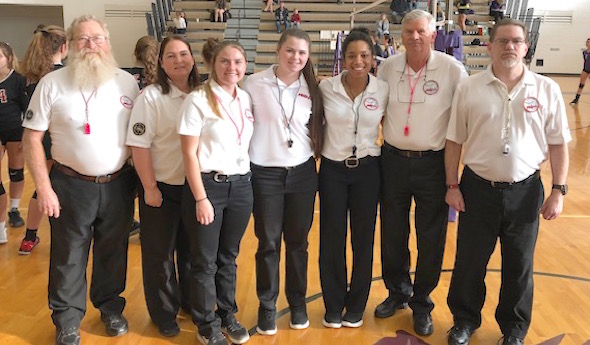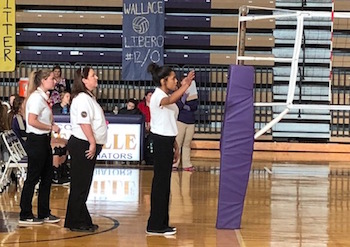
Not Just Another Season for Watson
May 3, 2018
By Cody Porter
NFHS High School Today
A 32-second response by emergency medical technicians was the difference in life or death for 68-year-old Willie Watson, who was spared from becoming another victim of sudden cardiac arrest.
Watson, a 38-year official for the Michigan High School Athletic Association, collapsed in the tunnel near the officials’ locker room after the Division 6 Football Final at Ford Field last Nov. 25 in Detroit. Fortunately for the Kalamazoo native, stadium staff members were steps away as he fell unconscious. Within seconds, their call for help reached on-site EMTs who swiftly made their way to him from the field.
“It was strange because I wasn’t sick or anything. I drove to the game by myself. Everything was fine, got dressed, and then went out on the field for the game,” Watson said. “After the game, I came to the locker room, had a boxed lunch, and the last thing I remember is leaving towards the tunnel. That’s the last thing that I remember. I woke up in the hospital the next day, on Saturday.”
Moments before Watson’s dire situation occurred, he stood in the officials’ locker room speaking with Mark Uyl, the MHSAA assistant director who coordinates officials. Uyl said when he received the call regarding Watson, he arrived to find paramedics administering full CPR, in addition to using an automated external defibrillator (AED).
“It was a scene right out of a movie,” Uyl said.
After about 10 minutes of work on Watson, Uyl said paramedics found a pulse and promptly transported him to Detroit Medical Center.
“Things were very critical that Friday night – very touch and go,” Uyl said. “Overnight we got reports that he was slowly improving.”
An implantable cardioverter defibrillator (ICD) was placed in Watson’s chest. The pager-sized device is battery powered and placed below the skin to monitor heart rate, according to the American Heart Association. If an abnormal heart rhythm is discovered, the ICD delivers an electric shock to restore a normal heartbeat.
“I got to witness an absolute miracle,” Uyl said. “If the cardiac situation doesn’t happen literally at the feet of the medical staff that we have on-site at an event like that, he would’ve gotten up to the concourse or, heaven forbid, outside the building into the parking lot or his car and I believe it would’ve been a much more tragic ending.”
Watson was working the third game of the day as a line judge, and when he collapsed, was beginning to leave the facility and head to a local hotel reserved for MHSAA officials. Uyl told Watson how much of a blessing it was that he was assigned that game. At home or at the hotel, Watson would have been alone without access to proper medical attention.
“Certainly, where we got lucky is where he collapsed,” Uyl said. “We have emergency procedures, but when we’re at one of our college or pro venues, we often use the building’s plan. It could not have been more seamless between our staff and the Ford Field building personnel.”
At MHSAA events, such as those at Ford Field, an ambulance and two EMTs are stationed on the field next to the tunnel that connects it to the other areas of the stadium. Watson said he and fellow officials routinely confirm the location of emergency responders before starting a game.
“Schools almost always have somebody from a university around who does training. Most schools have ambulance service there at the site,” Watson said. “There have been incidences where we have had injuries that require them to come out onto the field to assist a student-athlete. It could be a concussion, a leg injury or who knows. We always have somebody at a venue.”
Equipped with his ICD, Watson left for home a week later from Detroit Medical Center. Expecting to make a full recovery, Watson said the only recommendations from his doctors were to tweak his diet and increase exercise. Although he said his recovery is on track, one of the most notable effects from his incident was memory loss.
“The strange thing is that I cannot remember a single thing about the game. I can’t remember anything,” Watson said. “If you ask me what Ford Field looked like now, I couldn’t tell you. I lost my short-term memory. I remember everything except the game. It’s those 48 minutes that I can’t remember.”
An official in basketball, softball and volleyball as well, staying active won’t be too much of an issue for Watson, who said he took last basketball season off to get himself better prepared for the softball season.
“It’s just amazing how quickly they responded in my situation. Regardless of who it is, the response time I received was tremendous,” Watson said. “I was out. They had to revive me. It only took them 32 seconds to get to me. Even if it’s an injured player on the field, response times are getting so quick.”
PHOTO: Official Willie Watson signals a touchdown during the 2016 MHSAA Division 6 Final at Ford Field.

The Official View: All in This Together
By
Brent Rice
MHSAA Assistant Director
November 5, 2018
By Brent Rice
MHSAA Assistant Director
“The Official View” has received significant positive feedback, from both officials and non-officials – and we thank you for your interest in learning more about this essential avocation.
 This week, we discuss a promising effort to recruit Legacy officials and another “get-to-know-you” opportunity at MHSAA Sportsmanship Summits, plus dive into rules scenarios in volleyball and swimming.
This week, we discuss a promising effort to recruit Legacy officials and another “get-to-know-you” opportunity at MHSAA Sportsmanship Summits, plus dive into rules scenarios in volleyball and swimming.
It’s Official!
MHSAA officials will be presenting over the coming weeks at the annual Sportsmanship Summits held around the state. Renewed focus will be concentrated on the effect that poor sportsmanship has on the challenge of recruiting and retaining officials. Discussions will be led by noted officials in those areas to allow students to discuss the concerns and solutions to these issues.
Improving sportsmanship is a priority of the MHSAA Officials Program, and officials should be looking for new initiatives to support this goal. They include new policies on protecting officials, providing schools with framework to institute a Game Day Ambassadors Program, “Official Thanks” nights and several others.
Some efforts already have proven successful. “The Official View” continues to serve its purpose in humanizing the folks that officiate MHSAA contests. On that note, keep sending those photos and stories to [email protected] for features in The Official View. Ideally, submissions will be for in-season sports and include photo(s). Don’t forget to add the who, what, where, and when.
Rule of the Week
VOLLEYBALL As A1 tosses the ball in the air to serve, she realizes she is the improper server and catches the ball in attempt to force a re-serve. The proper server (A2) then immediately takes her place and makes a legal serve, scoring a point. A2’s toss for her second serve is bad and she catches the ball.
Ruling: This is an illegal serve and loss of rally/point. The re-serve privilege was used up by A1 since this was during A2’s term of service.
It’s Your Call
SWIMMING In the clip, the swimmer in Lane 5 begins to stray in her backstroke and ends up incidentally contacting the lane divider. She ultimately continues and wins the race. What’s the call?
Last Week’s IYC Ruling: In the clip, as the attacker and the keeper approach the ball, the attacker strikes the keeper’s ear. Since this is outside of the penalty area, a direct free kick would be awarded and the attacker would be assessed a yellow card. (Click to see last week's video.)
Official View: We’re All in This Together
The MHSAA Legacy Program has produced some terrific officials since its inception in 1992, many of whom are still officials today. We feel that recruiting eager and qualified officials is a collective partnership between the MHSAA, schools and officials associations around the state.
 For our part, the MHSAA offers a reduced registration fee for enrolled-student officials to get them started into officiating. We suggest that the schools and associations further alleviate these new officials from their startup costs by taking on this reduced fee. Schools benefit because they can then utilize these officials’ services at middle school and junior high school contests, and associations benefit because they are able to add a new official to their rosters for years to come.
For our part, the MHSAA offers a reduced registration fee for enrolled-student officials to get them started into officiating. We suggest that the schools and associations further alleviate these new officials from their startup costs by taking on this reduced fee. Schools benefit because they can then utilize these officials’ services at middle school and junior high school contests, and associations benefit because they are able to add a new official to their rosters for years to come.
Fowlerville has taking the lead in this area by recently hosting a Legacy clinic where veteran officials were paired with newly registered (paid for by Fowlerville Schools) Legacy officials and assigned to a volleyball match with local middle school Red Cedar League teams. This event allowed experienced mentor officials to provide on-the-spot constructive feedback in live game scenarios.
Other schools are following suit by hosting clinics and other events to draw new officials into the fold, including adding curriculum in officiating to next year’s course load. Schools interested in adding officiating to their curriculum can contact Brent Rice of the MHSAA for a curriculum outline and guides to make it a success.
PHOTOS: (Top) Fowlerville Legacy officials and mentors work a recent middle school volleyball match; left to right: John Garrison, Kelli Hart, Lindsey Darby, Jackie Jarvis, Dalaija Franklin, Rodney Horton and Tyler Hover. (Middle) Hart (mentor) instructs Franklin, far right, while Darby shadows. (Photos courtesy of the Fowlerville athletic department.)

